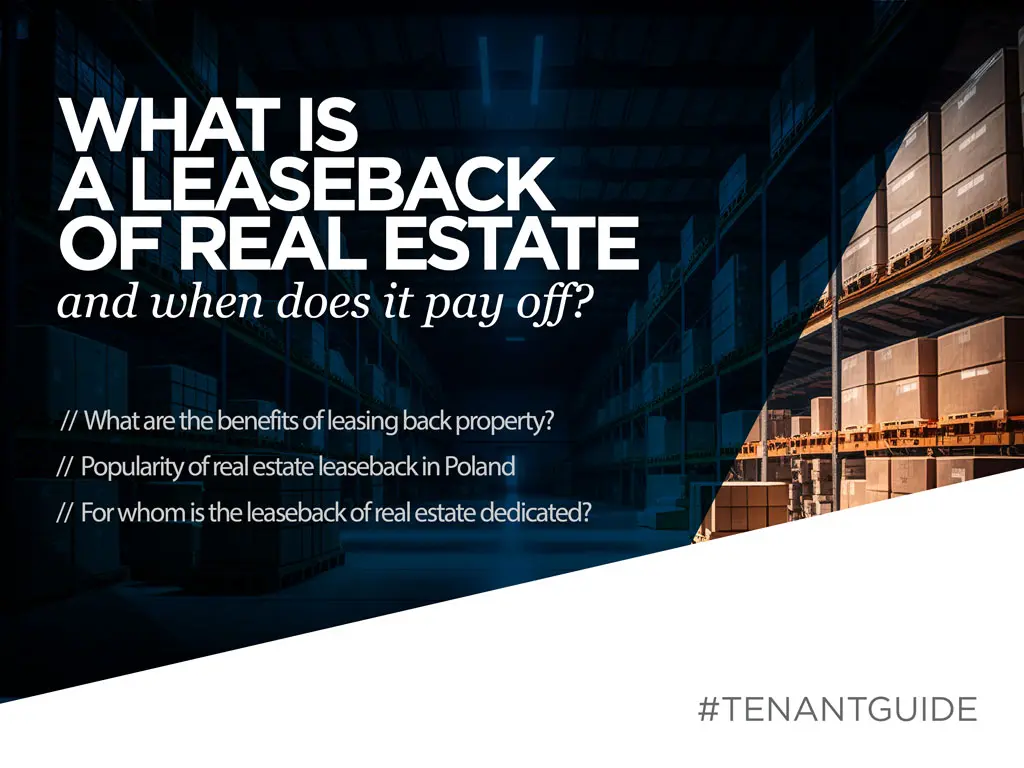What is a property leaseback and when is it profitable?
23 may 2023

Contents
What is a leaseback?
A leaseback is a property financing service that must meet several specific criteria. A financing company buys a property from the seller while the lessee (the former property owner) pays rent at the rate specified in a lease agreement. Next, the property is bought back for a predetermined price after an agreed-upon period of time.
What types of property do sale-and-leaseback transactions typically cover? In practice, they may cover office, industrial and retail properties and many other types of buildings. Fundamental are, however, valid building occupancy permits.
Such deals are usually made for five to fifteen years. The lease term must, however, match individual preferences and strategies. And what about property values? By all accounts, no minimum values are required and everything always depends on individual arrangements. This service is, however, usually available for commercial properties valued at PLN 2 million and more, with initial fees in the range of 15-30 percent.
Property leaseback types
There are generally two main types of property leasebacks available to companies: an operating lease and a finance lease.
The operating lease allows the lessor to retain the ownership right of a property during the lease term – it is also the lessor’s fixed asset. By contrast, under the finance lease the property becomes the lessee’s fixed asset as soon as the lease is signed. This is why the lessee is responsible for depreciation deductions, and transfer formalities will not take place until after the last payment is made.
The benefits of property leasebacks
Selling a property before using and buying it back may seem absurd to many. This mechanism, however, has many advantages and is very profitable in the short and long term.
The property leaseback is above all a way of financing current operations or business development (especially when operating in a competitive market) without having to relocate.
Another advantage is easier access to financing compared to taking a loan, for example. There will also be fewer formalities, which is important to many companies or organisations that have to fulfil too many obligations towards financing institutions at a particular time.
It is also worth noting that it is significantly easier and faster to secure a property leaseback than a mortgage. Companies seeking to secure financing will also face fewer formalities and lower requirements. A leaseback is therefore considered to be slightly more flexible, although this will depend on lease terms. A lease contract should best be discussed with knowledgeable experts who will provide guidance on all the nuances of a transaction.
How popular are property leasebacks in Poland?
The concept of a property leaseback originated in the United States. It is not very popular in Poland yet, but is gradually filtering through to companies seeking to optimise operating costs as best as possible. It is therefore a viable option for distressed companies which are reluctant to borrow from banks. A property leaseback is worthy of consideration but its attractiveness will depend primarily on lease conditions.
Many people may also have concerns about whether they will be able to get back their property after the lease expires. Of course, they will - this is guaranteed in a notary deed, which makes it a safe solution.
Who is the property leaseback for?
In addition to firms experiencing temporary financial difficulties and looking for cash to remain afloat, a property leaseback is also an option for companies planning to invest in acquisition of fixed assets. This type of lease makes it possible as it will supplement the working capital, which is extremely important to companies.
The property leaseback is one of the newer market solutions which is definitely worth considering. It has many practical advantages but must be carefully examined to decide whether it is suited to a company’s individual needs and whether it will support it in its current or planned operations.

